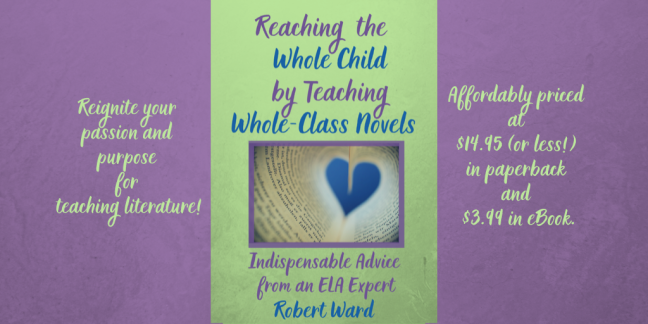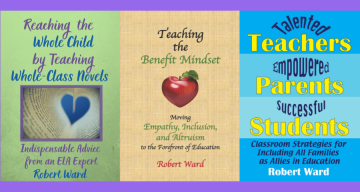This post is a companion to my Edutopia article, “Life Lessons from Fictional Characters.”

That article explains in detail the purpose, process, and benefits of Character Therapy, a literature-based approach to helping children overcome the negative effects of adversity.

Examples of Young Adult Books Suitable for Character Therapy
When looking for possible sources of conflict and trauma for YA characters, the following multicultural books, both classic and contemporary, are a good start. As I write in my book, Reaching the Whole Child by Teaching Whole-Class Novels, the Character Therapy process also often applies to more than one character within each novel.
Abuse, bullying: The Outsiders, The Watsons Go to Birmingham—1963, Shiloh, Speak, Wonder, Blubber
Neglect, abandonment, betrayal: Don’t You Dare Read This, Mrs. Dunphrey; Harry Potter; Matilda
Exclusion, isolation, injustice: Roll of Thunder, Hear My Cry; Island of the Blue Dolphins; The Watsons Go to Birmingham—1963; Kira-Kira; If I Stay; Number the Stars; The Diary of Anne Frank
Mental illness, drugs, alcohol: That Was Then, This is Now; House of the Scorpion; The Rest of Us Just Live Here; Mosquitoland
Violence, gangs: The Outsiders, House of the Scorpion, Drive-By, Buried Onions
War, disaster, injury, illness: Number the Stars, The Diary of Anne Frank, The Book Thief, The Fault in Our Stars, The Clay Marble
Loss– separation, divorce, death, incarceration, homelessness: The Outsiders, Hatchet, Maniac Magee, Holes, Harry Potter, Kira-Kira, House of the Scorpion, A Wrinkle in Time, Locomotion, If I Stay, Buried Onions

Adverse Childhood Experiences (ACE) Test
To begin Character Therapy, each student chooses one literary character who has experienced significant adverse childhood experiences. These characters will not be hard to find because young adult books often feature orphans and outsiders, but it is best to start this activity after students have finished reading the entire novel.
To determine the extent of their character’s trauma, students can have their character take the ACE test. This simple ten-question quiz will produce a score on a ten-point scale, with the highest scores indicating the greatest amount and sources of trauma. However, even a character’s low score on the ACE test can be indicative of considerable stress and strife.
Because of the sensitive nature of these questions, it is advised that teachers get signed permission slips after parents are provided access to preview the ACE test questions. Nothing on this questionnaire does not occur in young adult books, and parents can be assured that any delicate issues have already been appropriately discussed while reading the class novel in question. In addition, students will be cautioned not to dwell upon graphic details but instead to focus on helping the character through their pain, shame, and fear.
Although it is not advised for teachers to tell their students to take the ACE test for themselves, be prepared for some students to do so on their own anyway. Students may even be overheard sharing their personal ACE scores with their classmates, and some students may reveal to their teacher their own traumatic experiences, both past and present.
Therefore, it is wise to inform students in advance that every teacher is a mandated reporter and that this type of reporting is one important way kids in dangerous situations receive the professional help they need. If interacting with the ACE test spurs some students to disclose areas in their lives where they are suffering and to seek support, then this English assignment has proven as practical and prescient as our current situation of suicides and shootings demand.

Sample Character Therapy Dialogue with Ponyboy Curtis from The Outsiders
Part 1. Speaking Truth
Robert: Hi, Ponyboy. After seeing that your ACE score is 2, I know you’re dealing with some hurtful feelings. I really want to listen to you. Please share with me the major sources of pain, shame, or fear that are continuing to haunt, hurt, or hold you back.
Ponyboy: Thank you, Robert. I guess the biggest pain in my life is that my parents died in a car crash eight months ago. My big brother Darry didn’t go to college so he could work full time and be the guardian for me and my other brother, Sodapop. Otherwise, we would have all been split up.
Robert: I am so sorry about losing your parents, Pony. My parents are divorced, but I have no idea what it’s like to be an orphan. That was also really nice of Darry to put his dreams on hold. I know Soda also works full time so you can finish high school.
Ponyboy: Yeah, Soda is great, but Darry really doesn’t want me around. He loves Soda but hates me. He’s always on me for every little thing. He’s way more mean than my dad was.
Robert: Oh, life at home must be rough on you. Do you have friends you can count on?
Ponyboy: Yeah, my gang is like a second family. Johnny is my best friend. But Dallas scares me, and Steve thinks I’m a tagalong. Two-Bit is fun, though. The thing is, we always get harassed and beaten up by the Socs. They hate us because we’re greasers, but they don’t even know us. They jumped me the other day and cut up Johnny real bad a few months ago.
I ended up running away from home because Darry hit me, and that night Johnny accidentally killed a Soc. It’s a long story, but Johnny ended up in the hospital and was paralyzed because of a broken back. Johnny died, and Dallas committed suicide because he couldn’t handle the pain. I don’t think I can take much more. My life is a mess, huh?
Part 2. Acknowledging Feelings
Robert: Thanks for your honesty, Ponyboy. It’s completely understandable that you have strong, upsetting feelings when four people you were close to passed away very suddenly. I want to understand more. Please explain to me how your thoughts about what has happened to you bring up frequent feelings of anger, anguish, or apathy. What makes you mad, sad, or not care?
Ponyboy: Are you kidding? I’m constantly sad. I don’t really get angry as much as I just close off. For a time, I even pretended that Johnny and Dallas weren’t dead. I just couldn’t bear to face the pain.
Part 3. Analyzing Actions
Robert: I want to help you figure this out. Let’s discuss how your frequent sad feelings lead you to pursue isolation. What are you running from, and who do you take it out on? How does this closing off from others hurt or help you?
Ponyboy: At first, I thought I was running from Darry and that he would be glad that I was gone. Now I realize he was only being strict and critical because he wanted the best for me. He wanted me to have all the things he had sacrificed for me. He doesn’t hate me; he’s just so scared of losing someone else he loves that he has been suffocating me instead of encouraging me. I still don’t like how he gets sometimes, but I’m learning to squeeze him back when he nags me—but all in a more loving and joking way. Things are a lot, a lot better between us now.
Robert: I’m so glad things are better at home. What about with dealing with the deaths of Johnny and Dallas?
Ponyboy: That’s getting better, too, but that and the deaths of my parents are going to be with me forever. What I now know is I have to live the best life I can in tribute to my friends and my mom and dad. The last thing they would want is for me to waste my life in sorrow.
That’s what Johnny wanted for me and Dallas before he died– for both of us to live happy, productive lives. And now that I’m the only one left, I have to make something of my life for Johnny and Dallas both—and for my parents. God, I miss them all so much!
Part 4. Moving Forward
Robert: I want to support you in continuing to make better choices. I’m really proud of you, Pony. You are beginning to deal with all this pain so much better. Let’s strategize how you can find an even stronger sense of belonging, as well as how you can become a source of benefit to yourself and to others.
Ponyboy: I’m working this out, too. I realized that Steve and Two-Bit come from messed up homes. I can help them stay out of trouble and find good jobs. But my first priority is being there for Soda. I completely overlooked how much pain he was in when his girlfriend, Sandy, got pregnant by another guy and moved to Florida.
Robert: I love how you are focusing on the needs of others as well as yourself. I always find that when I help someone else, I forget about my own troubles for a while and also feel good that I brought some joy or relief to others.
I know that you get put into the high-level classes at school; perhaps you should consider tutoring kids to earn extra money and to benefit others. I also think being part of the track team is a wonderful way to do something you enjoy, to bond with friends, and to feel part of something greater than yourself.
I truly think you are going to be okay, Ponyboy. Follow Johnny’s advice and stay gold.
Ponyboy: Thanks, Robert. I actually feel good talking with you. I know now that “stay gold” means to appreciate what you have. I may not have a lot, and I may have experienced a lot of bad things at a young age, but I do feel lucky for my family and friends and feel positive about my future.
Robert: The pleasure was mine, Mr. Curtis! Feel free to talk to me anytime.
***

If you liked this article, you’ll love my new book, Reaching the Whole Child by Teaching Whole-Class Novels. It’s my love letter to ELA teachers who want to teach with equal parts practicality and passion!

This article was also featured by SmartBrief, “How Imagined Dialogue Can Help Students.”

It also was honored with the SmartBrief Education Editor’s Choice Content Award.
You can also listen to an Education Talk Radio interview I did about this article, as well as follow the discussion on Facebook.
Here’s a related article from KQED’s MindShift blog about Bibliotherapy.



2 thoughts on “Character Therapy: Examples, ACE, and a Sample Dialogue”